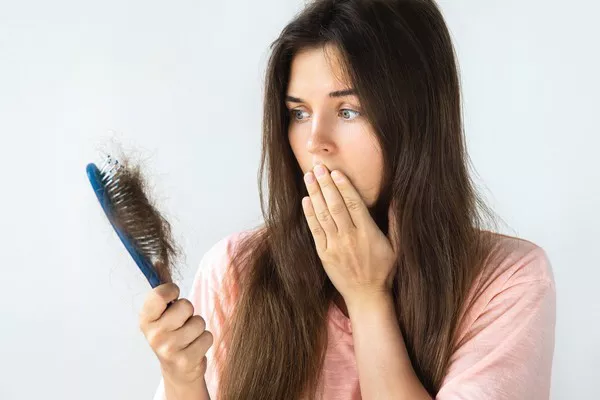Hair loss can be a distressing experience for many women, and understanding its underlying causes is crucial for effective management. Estrogen, a primary female sex hormone, plays a significant role in various bodily functions, including hair growth. In this article, we will explore the relationship between hair loss and low estrogen levels in females, the potential causes, and the available treatment options.
1. The Role of Estrogen in Hair Growth
Estrogen is a hormone produced primarily by the ovaries in women. It plays a vital role in regulating the menstrual cycle, supporting reproductive health, and influencing various physiological processes, including hair growth. Estrogen helps to prolong the growth phase of the hair follicles, known as the anagen phase. This results in thicker, more lustrous hair. It also helps to maintain the hair’s structural integrity, promoting overall hair health.
2. Estrogen Levels and Hair Loss
When estrogen levels fluctuate or decline, it can affect the hair growth cycle, leading to hair loss. One common condition associated with low estrogen levels is androgenetic alopecia, also known as female pattern hair loss. While the term “androgenetic” may suggest the involvement of androgens (male hormones), hormonal imbalances, including low estrogen, can contribute to this condition. Low estrogen levels can shorten the anagen phase and accelerate the transition to the telogen phase (resting phase), leading to increased hair shedding and thinning.
3. Menopause and Hair Loss
Menopause is a natural phase of a woman’s life, marking the end of her reproductive years. During menopause, estrogen production decreases significantly. As a result, many women experience hair thinning and loss. This is often attributed to the hormonal changes and imbalances that occur during this transition.
4. Other Causes of Low Estrogen and Hair Loss
a. Polycystic Ovary Syndrome (PCOS)
PCOS is a hormonal disorder characterized by higher levels of androgens and irregular menstrual cycles. It can also lead to insulin resistance. Women with PCOS may experience hair loss due to the androgen excess and potential imbalances in estrogen.
b. Stress and Hormonal Disruptions
Chronic stress can disrupt the delicate balance of hormones in the body, including estrogen. This disruption may lead to hair loss as the hair growth cycle is affected.
c. Thyroid Disorders
Thyroid hormones play a crucial role in regulating metabolism and other hormonal functions in the body. Both hypothyroidism (underactive thyroid) and hyperthyroidism (overactive thyroid) can lead to hair loss, and they may also impact estrogen levels.
5. Diagnosis and Treatment
If you are experiencing hair loss and suspect low estrogen levels may be a contributing factor, it is essential to consult with a healthcare professional. They will conduct a thorough evaluation, including medical history, physical examination, and possibly blood tests to assess hormone levels.
6. Treatment Options
a. Hormone Replacement Therapy (HRT)
For women experiencing hair loss due to menopause or hormonal imbalances, hormone replacement therapy (HRT) may be recommended. HRT involves supplementing the body with synthetic or bio-identical hormones, such as estrogen, to restore hormonal balance.
b. Minoxidil
Minoxidil is an FDA-approved topical medication used to treat female pattern hair loss. It is applied directly to the scalp and may help promote hair regrowth by stimulating hair follicles.
c. Lifestyle Changes
In some cases, adopting a healthier lifestyle can help balance hormone levels and improve overall hair health. Regular exercise, a balanced diet, stress reduction techniques, and getting sufficient sleep are essential components of a healthy lifestyle.
7. Hair Care and Styling
While addressing the hormonal aspects of hair loss is crucial, taking care of your hair is equally important. Use gentle hair care products, avoid excessive heat styling, and refrain from tight hairstyles that may put stress on the hair follicles.
Conclusion
Hair loss can be a distressing symptom, and low estrogen levels may contribute to hair thinning and shedding in females. Estrogen plays a crucial role in supporting hair growth and maintaining hair health. Fluctuations or deficiencies in estrogen can disrupt the hair growth cycle and lead to hair loss. If you suspect low estrogen levels are causing your hair loss, it is essential to seek medical advice and undergo a proper evaluation. Treatment options may include hormone replacement therapy, minoxidil, and lifestyle changes. While hormonal imbalances can impact hair health, it is essential to adopt a holistic approach to hair care, including proper hair care practices and healthy lifestyle habits. Remember, each individual’s hair loss experience is unique, and personalized care is key to effectively managing this concern.

